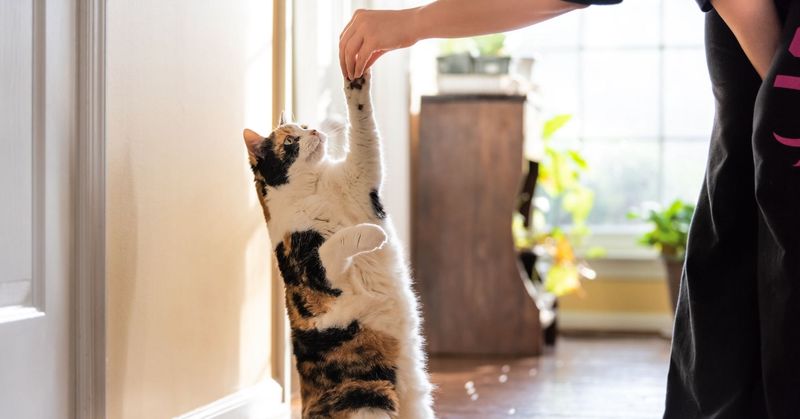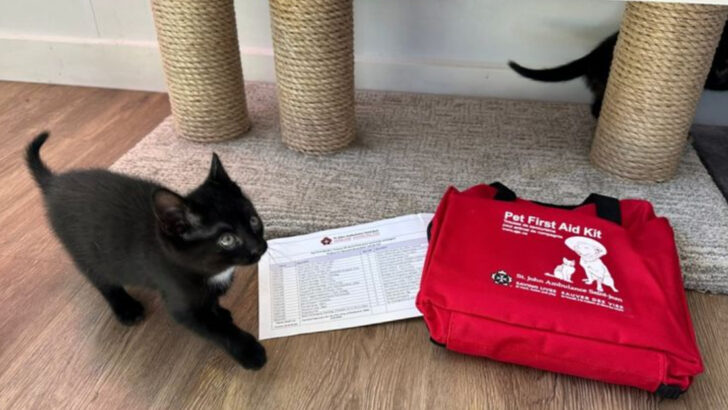Being a cat owner is more than just filling a food bowl and offering a scratch behind the ears. It’s about truly understanding your feline companion and creating an environment where they feel safe, loved, and healthy.
Cats may be independent, but they still need us to meet their needs. From ensuring regular vet check-ups to providing the right kind of mental stimulation, responsible cat owners know that a little extra effort goes a long way in keeping their cats happy.
In this post, we’ll explore 16 essential habits every cat owner should adopt. These simple practices will strengthen your bond, improve your cat’s well-being, and ensure your furry friend has a fulfilling life. Whether you’re a seasoned cat parent or new to the game, these tips will help you be the best cat owner you can be. Let’s get started!
Regular Veterinary Visits

Ensuring your cat’s health involves regular veterinary visits. Scheduling annual check-ups is crucial for monitoring their well-being and catching any potential health issues early.
Vaccinations, dental check-ups, and parasite control are important parts of these visits. A responsible cat owner also keeps track of their cat’s medical records and follows the vet’s recommendations.
These visits not only help in maintaining your cat’s health but also in building a trusting relationship with your veterinarian. By doing so, you can ensure your feline friend enjoys a long, happy life.
Balanced Diet and Nutrition

Feeding your cat a balanced diet is essential for their overall health. High-quality cat food tailored to their age, size, and health needs is a must. Consult your vet for specific dietary recommendations, considering any allergies or special needs your cat may have.
Regularly providing fresh water and monitoring their weight helps in maintaining optimal health. Avoid feeding them human food, which can lead to obesity or health issues.
A responsible owner understands the importance of nutrition and actively seeks the best options for their feline companion.
Proper Litter Box Maintenance

Keeping the litter box clean is a vital task for cat owners. Scooping the box daily and changing the litter regularly prevents unpleasant odors and keeps your cat comfortable.
Placement of the litter box in a quiet, accessible area encourages regular use. Responsible owners also pay attention to their cat’s bathroom habits, as changes can signal health issues.
By maintaining cleanliness and providing an inviting space, you help your cat feel secure and satisfied. This simple yet essential practice enhances your cat’s quality of life.
Providing Enrichment and Playtime

Cats are natural hunters and need mental and physical stimulation. Providing toys, scratching posts, and interactive playtime satisfies their instincts and prevents boredom.
Regular play sessions strengthen your bond with your cat and improve their physical health. Rotate toys to keep them interested and challenge them with puzzle feeders or chasing games.
Enrichment activities cater to your cat’s curiosity and enhance their quality of life. Responsible owners make time for these activities, ensuring a happy and active feline.
Grooming and Hygiene

Regular grooming is essential, especially for long-haired cats. Brushing helps reduce shedding, prevents matting, and strengthens the bond between you and your cat.
Bathing is usually not necessary, but if needed, use cat-friendly products. Regularly check and clean their ears, teeth, and paws. Trimming claws prevents damage to furniture and reduces the risk of injury.
Grooming is a time for bonding and ensures your cat looks and feels their best. Responsible owners make grooming a routine part of their care regimen.
Social Interaction and Bonding

Cats may be independent, but they need social interaction. Spending quality time with your cat helps build a strong bond. Gentle petting, talking, and playing are ways to show affection.
Understanding their body language and respecting their boundaries is key to a harmonious relationship. Inviting friends over for playdates can also offer socialization opportunities.
By actively engaging with your cat, you foster trust and a sense of security. A responsible owner knows the value of these interactions in nurturing a loving relationship.
Safe Indoor Environment

Creating a safe indoor environment is vital for your cat’s well-being. Remove any toxic plants, secure windows, and keep household cleaners out of reach. Provide a comfortable space with cozy beds and hiding spots.
Monitor potential hazards like electrical cords or choking hazards. Ensure that the house’s temperature is suitable for your cat’s comfort.
A safe environment prevents accidents and gives your cat a stress-free home. Responsible owners take these precautionary steps to guarantee their cat’s safety and happiness.
Regular Exercise and Activity

Regular exercise is crucial for maintaining your cat’s health. Engaging them in activities like running, climbing, or playing fetch keeps them fit and agile. Create an indoor obstacle course or allow supervised outdoor time in a secure area.
Exercise helps prevent obesity and related health issues, promoting a longer, healthier life. Encouraging an active lifestyle requires creativity and commitment.
Responsible owners understand the importance of regular physical activity and make it a part of their cat’s daily routine.
Training and Behavioral Guidance

Training your cat may seem challenging, but it’s possible with patience and consistency. Teaching basic commands like sit or come can enhance communication and safety.
Use positive reinforcement techniques, rewarding desired behaviors with treats or affection. Address behavioral issues like scratching or biting by understanding triggers and providing alternatives.
Training strengthens the bond between you and your cat, making daily life more enjoyable. A responsible owner embraces this opportunity to guide their cat’s behavior positively.
Health Monitoring and Awareness

Regularly monitoring your cat’s health ensures early detection of potential issues. Keep track of their weight, appetite, and behavior changes. Regularly check their eyes, ears, and coat for signs of illness.
Maintain a record of vaccinations, medications, and any health concerns. Awareness of your cat’s normal behavior allows you to notice abnormalities quickly.
Promptly consulting a veterinarian when needed is part of a responsible owner’s duties. Vigilant health monitoring helps in maintaining a healthy and happy feline companion.
Respecting Individual Needs

Every cat is unique, with individual preferences and needs. Understanding and respecting these differences is crucial for a harmonious relationship. Some cats enjoy socializing, while others prefer solitude.
Pay attention to your cat’s cues and provide them with the environment they thrive in. Offering choices in toys, sleeping spots, and interaction levels respects their individuality.
Responsible cat owners recognize and celebrate these differences, creating a loving and supportive home for their feline friends.
Travel Safety and Comfort

Traveling with your cat requires preparation to ensure their comfort and safety. Use a sturdy carrier and secure it in the vehicle. Familiarize your cat with the carrier beforehand to reduce stress.
Keep travel essentials like food, water, and litter within reach. For long journeys, plan breaks to allow your cat some rest and relaxation.
Consulting with your vet for additional travel tips can be beneficial. A responsible owner prioritizes their cat’s well-being during travel, making the experience as smooth as possible.
Responsible Breeding Choices

Responsible breeding involves making informed decisions that prioritize the health and well-being of the cats. Thoroughly research breeders, ensuring they adhere to ethical practices and provide proper care.
Consider adopting from shelters to support rescue efforts. Avoid backyard breeders or pet mills that prioritize profit over the animals’ welfare. Spaying or neutering your cat is another responsible choice, preventing overpopulation.
Making informed decisions about breeding reflects a commitment to your cat’s health and the broader feline community.
Community Engagement and Support

Being part of a community of cat owners offers support and shared knowledge. Engaging with local clubs, online forums, or social media groups can provide valuable insights and camaraderie.
Sharing experiences and tips with fellow cat enthusiasts fosters connections and learning opportunities. Participate in community events like adoption drives or workshops to contribute positively to the cat-loving community.
A responsible owner recognizes the importance of community engagement, enriching their experience as a cat parent.
Emergency Preparedness and Planning

Preparation for emergencies ensures your cat’s safety during unforeseen events. Assemble a kit with essentials like food, water, medications, and important documents.
Create an evacuation plan that includes your cat, ensuring they have a safe carrier and destination. Familiarize your cat with the carrier and practice evacuation routes.
Communication with neighbors or friends for assistance during emergencies is also wise. Responsible owners plan for these scenarios, ensuring their cat’s safety and well-being regardless of the situation.
End-of-Life Care and Decisions

End-of-life care is a sensitive subject, requiring compassion and thoughtful consideration. Providing comfort and addressing pain management can ease this challenging time.
Regularly consult with your veterinarian to make informed decisions about your cat’s quality of life. Discuss options like hospice care or euthanasia with family members.
This phase requires emotional support and understanding from those around you. A responsible owner approaches end-of-life decisions with empathy and respect, honoring their cat’s journey with dignity.

